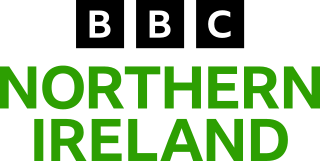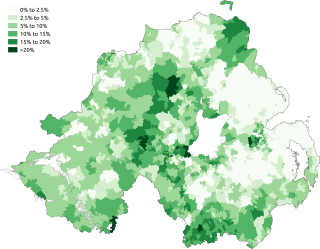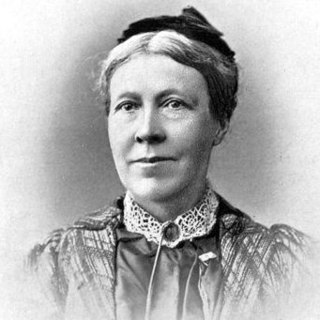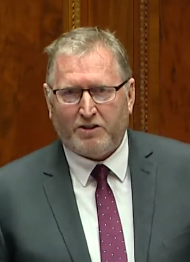Related Research Articles

Belfast is the capital city and principal port of Northern Ireland, standing on the banks of the River Lagan and connected to the open sea through Belfast Lough and the North Channel. It is second to Dublin as the largest city on the island of Ireland with a population in 2021 of 345,418 and a metro area population of 671,559.

Northern Ireland is a part of the United Kingdom in the north-east of the island of Ireland that is variously described as a country, province or region. Northern Ireland shares an open border to the south and west with the Republic of Ireland. At the 2021 census, its population was 1,903,175, making up around 3% of the UK's population and 27% of the population on the island of Ireland. The Northern Ireland Assembly, established by the Northern Ireland Act 1998, holds responsibility for a range of devolved policy matters, while other areas are reserved for the UK Government. The government of Northern Ireland cooperates with the government of Ireland in several areas under the terms of the Belfast Agreement. The Republic of Ireland also has a consultative role on non-devolved governmental matters through the British–Irish Governmental Conference (BIIG).

The Ulster Unionist Party (UUP) is a unionist political party in Northern Ireland. The party was founded as the Ulster Unionist Council in 1905, emerging from the Irish Unionist Alliance in Ulster. Under Edward Carson, it led unionist opposition to the Irish Home Rule movement. Following the partition of Ireland, it was the governing party of Northern Ireland between 1921 and 1972. It was supported by most unionist voters throughout the conflict known as the Troubles, during which time it was often referred to as the Official Unionist Party (OUP).

The Ulster Volunteer Force (UVF) is an Ulster loyalist paramilitary group based in Northern Ireland. Formed in 1965, it first emerged in 1966. Its first leader was Gusty Spence, a former British Army soldier from Northern Ireland. The group undertook an armed campaign of almost thirty years during The Troubles. It declared a ceasefire in 1994 and officially ended its campaign in 2007, although some of its members have continued to engage in violence and criminal activities. The group is a proscribed organisation and is on the terrorist organisation list of the United Kingdom.

Ian Richard Kyle Paisley, Baron Bannside, was a loyalist politician and Protestant religious leader from Northern Ireland who served as leader of the Democratic Unionist Party (DUP) from 1971 to 2008 and First Minister of Northern Ireland from 2007 to 2008.

The Ulster Defence Association (UDA) is an Ulster loyalist paramilitary group in Northern Ireland. It was formed in September 1971 as an umbrella group for various loyalist groups and undertook an armed campaign of almost 24 years as one of the participants of the Troubles. Its declared goal was to defend Ulster Protestant loyalist areas and to combat Irish republicanism, particularly the Provisional Irish Republican Army (IRA). In the 1970s, uniformed UDA members openly patrolled these areas armed with batons and held large marches and rallies. Within the UDA was a group tasked with launching paramilitary attacks that used the cover name Ulster Freedom Fighters (UFF) so that the UDA would not be outlawed. The British government proscribed the UFF as a terrorist group in November 1973, but the UDA itself was not proscribed until August 1992.

The Democratic Unionist Party (DUP) is a unionist, loyalist, British nationalist and national conservative political party in Northern Ireland. It was founded in 1971 during the Troubles by Ian Paisley, who led the party for the next 37 years. Currently led by Jeffrey Donaldson, it is the second largest party in the Northern Ireland Assembly, and is the fifth-largest party in the House of Commons of the United Kingdom. The party has been described as centre-right to right-wing and socially conservative, being anti-abortion and opposing same-sex marriage. The DUP sees itself as defending Britishness and Ulster Protestant culture against Irish nationalism and republicanism. It is also Eurosceptic and supported Brexit.

BBC Northern Ireland is a division of the BBC and the main public broadcaster in Northern Ireland. It is widely available across both Northern Ireland and the Republic of Ireland.

The Irish language is, since 2022, an official language in Northern Ireland. The main dialect spoken there is Ulster Irish. Protection for the Irish language in Northern Ireland stems largely from the European Charter for Regional or Minority Languages.

Sir Jeffrey Mark Donaldson is a British politician who has served as leader of the Democratic Unionist Party (DUP) since June 2021. He has been the Member of Parliament (MP) for Lagan Valley since 1997, and leader of the DUP in the UK House of Commons since 2019. As of 2024, he is Northern Ireland's longest-serving MP.

Peter David Robinson is a retired Northern Irish politician who served as First Minister of Northern Ireland from 2008 until 2016 and Leader of the Democratic Unionist Party (DUP) from 2008 until 2015. Until his retirement in 2016, Robinson was involved in Northern Irish politics for over 40 years, being a founding member of the DUP along with Ian Paisley.
The News Letter is one of Northern Ireland's main daily newspapers, published from Monday to Saturday. It is the world's oldest English-language general daily newspaper still in publication, having first been printed in 1737. The newspaper's editorial stance and readership, while originally republican at the time of its inception, is now unionist. Its primary competitors are the Belfast Telegraph and The Irish News.

Newtownabbey is a large settlement north of Belfast city centre in County Antrim, Northern Ireland. It is separated from the rest of the city by Cavehill and Fortwilliam golf course, but it still forms part of the Belfast metropolitan area. It surrounds Carnmoney Hill, and was formed from the merging of several small villages including Whiteabbey, Glengormley and Carnmoney. At the 2021 census, Metropolitan Newtownabbey Settlement had a population of 67,599, making it the third largest settlement in Northern Ireland and 7th on the seventh on the Island of Ireland. It is part of Antrim and Newtownabbey Borough Council.
Aodán Mac Póilin was an Irish language activist in Northern Ireland.
The Troubles were a period of conflict in Northern Ireland involving republican and loyalist paramilitaries, the British security forces, and civil rights groups. They are usually dated from the late 1960s through to the Good Friday Agreement of 1998. However, sporadic violence continued after this point. Those that continued violence past this point are referred to as "dissident republicans and loyalists". The Troubles, internationally known as the Northern Ireland conflict, claimed roughly 3500 lives.

Lesbian, gay, bisexual, and transgender (LGBT) rights in Northern Ireland have traditionally been slower to advance than the rest of the United Kingdom, with the region having lagged behind England, Scotland, and Wales. Northern Ireland was the last part of the United Kingdom where same-sex sexual activity was decriminalised, the last to implement a blood donation “monogamous no waiting period” policy system for men who have sex with men and, after intervention by the Parliament of the United Kingdom, the last to allow same-sex marriage. Compared to the neighbouring Republic of Ireland, all major LGBT rights milestones had been reached earlier in Northern Ireland, with the exception of same-sex marriage. Homosexuality was decriminalised in Northern Ireland a decade earlier and civil partnerships were introduced six years earlier.

Robin Swann is a Northern Irish unionist politician currently serving as Minister of Health since 2024. He previously held this office from 2020 to 2022. Swann has been a Member of the Legislative Assembly (MLA) for North Antrim since 2011. He also served as leader of the Ulster Unionist Party (UUP) from 2017 to 2019.

Isabella Maria Susan Tod was a Scottish-born campaigner for women’s civil and political equality, active in the north of Ireland. She lobbied for women’s rights to education and to property, for the dignified treatment of sex workers and, as an Irish unionist, for female suffrage. In 1887, her North of Ireland Suffrage Society helped secure the municipal vote for women in Belfast.

Douglas Ricardo Beattie is a Northern Irish politician and former member of the British Army, who has been leader of the Ulster Unionist Party (UUP) since 27 May 2021. He has been a Member of the Northern Ireland Assembly (MLA) for Upper Bann since 2016. He is characterised as a 'progressive' and 'liberal' unionist.

Emma Little-Pengelly is a Northern Irish barrister and Democratic Unionist Party (DUP) politician serving as the deputy First Minister of Northern Ireland since February 2024. She has been a Member of the Legislative Assembly (MLA) for Lagan Valley since May 2022, when she was co-opted (appointed) to replace DUP party leader Sir Jeffrey Donaldson, who declined to take up his seat following the 2022 election.
References
- ↑ McHardy, Anne (21 September 2006). "James Hawthorne". The Guardian. Retrieved 31 July 2016.
- 1 2 "Ulster History Circle" . Retrieved 12 July 2009.
- ↑ Former Controller of BBC NI dies BBC News, 7 September 2006. Accessed 7 June 2007.